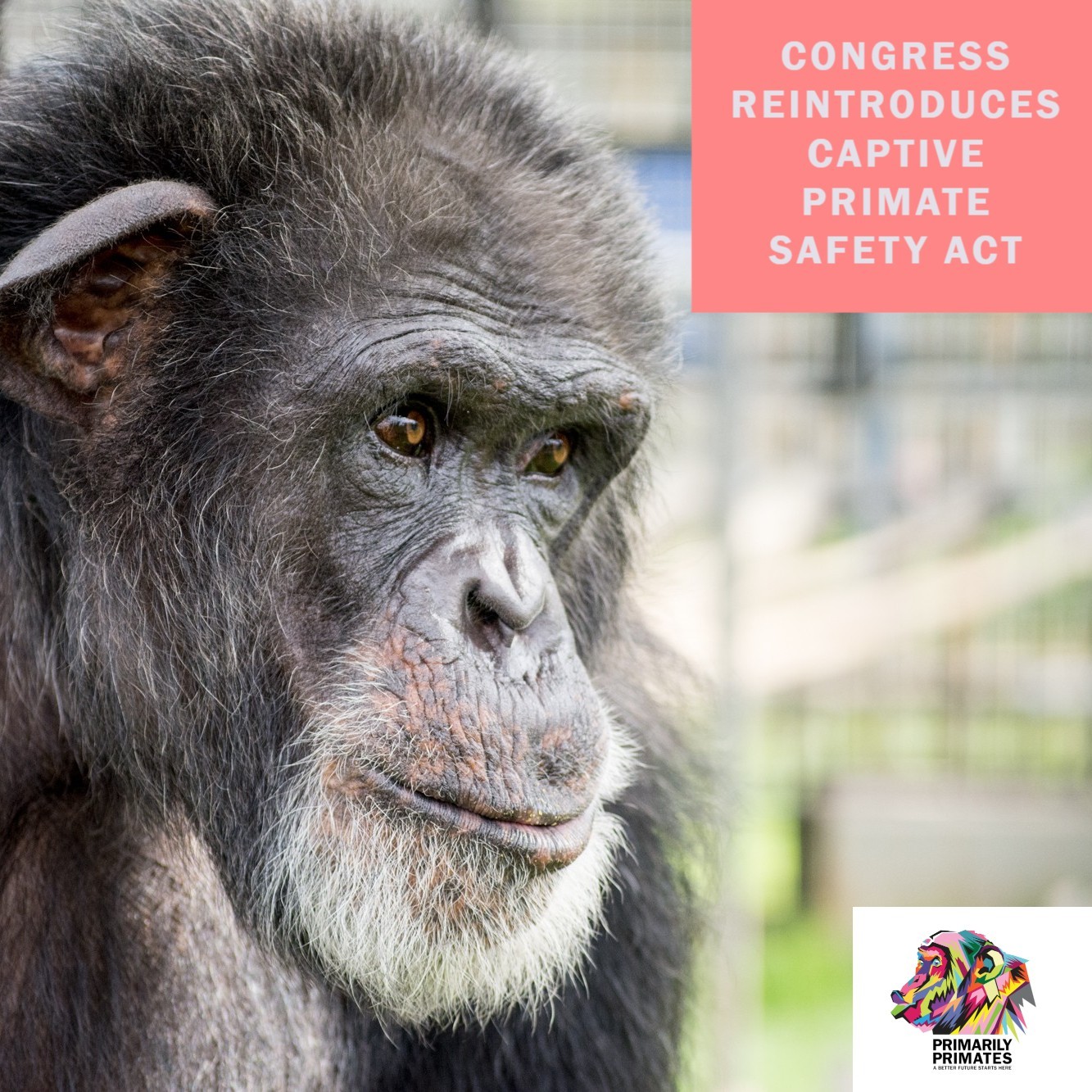On May 6, Congress reintroduced the Captive Primate Safety Act (CPSA), which would end the cruel and selfish pet primate trade in the United States. Primates suffer enormously when kept as pets. They can also injure or spread disease to the people around them.
The bill is sponsored by Reps. Mike Quigley (D-IL), Brian Fitzpatrick (R-PA), Julia Brownley (D-CA), and Nancy Mace (R-SC), and Sen. Richard Blumenthal (D-CT).
“The Captive Primate Safety Act is meant to protect humans and primates. Primates are not meant to be pets or playthings,” Blumenthal said.
Friends of Animals knows all too well that primates—who are highly social and intelligent—belong in the wild and not exploited as pets. That is because FoA has managed Texas-based Primarily Primates sanctuary since 2007. A staggering 100 of our 199 primates at PPI are ex-pets—including lemurs, spider monkeys, capuchins and chimps.
They were often kept alone in small cages without the ability to socialize and bond with their own kind. Their lives were dismal. Some arrive overweight with nervous habits, such as self-harm or feverishly pacing their enclosure.
Non-human primates are most often abandoned by their owners between the ages of two and eight (depending on the species) after they have started maturing, and sometimes after their owners have had their teeth removed to restrict their assertive personalities.
Long overdue
Blumenthal pointed out to FoA that he first introduced the CPSA in 2009 after the gruesome tragedy in Connecticut involving a chimpanzee named Travis who was being exploited as a pet when he attacked Charla Nash. Nash was called to the house of Travis’ owner after she expressed difficulty getting the 200-pound chimpanzee back into his enclosure. Nash survived but had to endure face and hand transplant surgery, and Travis was killed by a police officer called to the scene.
“That tragedy should have spurred passage of the Captive Primate Safety Act. But nothing has happened. Now our hope is the HBO Max docuseries 'Chimp Crazy’ will give us the impetus to pass this measure,” Blumenthal said.
FoA will be at The Capitol in Washington, D.C. May 14 to attend an event to raise awareness of CPSA. Attendees will be able to learn about the scandalous, shocking and heart-wrenching stories of pet primate ownership as depicted in highlights from “Chimp Crazy” and why passing the CPSA is a crucial solution to the problem.
A closer look at the pet trade
It is illegal to import primates into the United States for the pet trade, but breeders inside the country provide a continuous supply of baby primates to meet the demand. The internet is rife with advertisements for primates for sale, and these dealers ship infants to buyers across the nation. For little money, a person can buy virtually any species of primate, but buyers rarely understand the truth about owning these animals.
The total number of pet primates in the United States is unknown, but most estimates suggest there are thousands, if not tens of thousands. This is a problem that requires a federal solution. While some states ban private ownership of primates, others impose only partial restrictions or have none whatsoever. This regulatory patchwork is failing to protect public safety and animal welfare.
This federal legislation would protect not only the animals but also the communities that may come face to face with these dangerous wild animals. Over the past few decades, pet primates have injured hundreds of people. They have mauled neighbors, turned on their owners and endangered local police officers and emergency personnel, who must expend countless hours and resources responding to escapes, attacks and cruelty cases. They can also easily transmit viral, bacterial, parasitic and fungal diseases to humans.
Primates belong in the wild—not in a home. For everyone’s safety, please contact your federal senators and representative (find them here) and ask them to cosponsor the Captive Primate Safety Act!
“Monkeys and apes belong in the wild—not in living rooms. This bill will ban private possession of these animals, ensuring that we are safe and primates are able to live freely,” said Quigley, co-chair of the Congressional Animal Protection Caucus. “As the lead sponsor of the 2022 Big Cat Public Safety Act, I’m proud to sponsor the Captive Primate Safety Act to advance the same protections for primates.”

